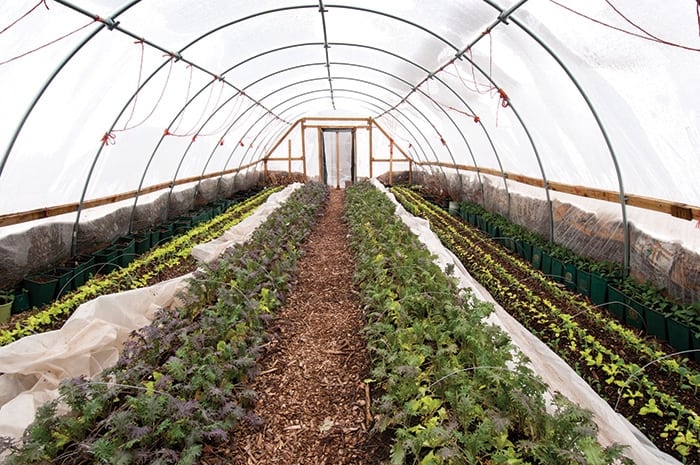
City dwellers are no strangers to small-space gardening; tomato plants grow on narrow decks and kitchen gardens turn out an abundance of herbs. Now some enterprising urbanites are taking it to the next level, reclaiming vacant lots for community gardens, growing produce on rooftops and distributing fresh food to neighborhoods that need it most.
Unlike rural farms where crops stretch to the horizon, urban farmers think up, not out — and they do a lot with little square footage.
From Gray to Green
Urban agriculture proponents claim that city farms replace urban blight with green space, eradicate food deserts and spark economic development. Two such farms are growing on Chicago’s South Side.
Nestled in the Back of the Yards neighborhood immortalized by Upton Sinclair’s The Jungle, The Plant is a former meatpacking factory (Peer Foods) undergoing a metamorphosis into a futuristic vertical farm. While The Plant is still an industrial labyrinth of brick and steel, its founders are working to produce healthful food and jobs in the economically distressed neighborhood.
The Plant grows greens, fish and mushrooms and is home to two bakeries. It hopes to add a brewery soon. The businesses work together to create a closed-loop production environment: Urban farmers grow greens and fish simultaneously in aquaponic farming systems that reduce water, pesticide and fertilizer use. Fish waste feeds plants and the plants clean water for the fish.
Eventually, The Plant’s founders hope to employ 125 people. The Plant will offer educational programs in farming, cooking and basic business skills, and a commissary kitchen will help food entrepreneurs reduce the overhead costs of running a private commercial kitchen.
“[Peer Foods] used to employ about 400 people from the surrounding neighborhood,” says Melanie Hoekstra, director of operations at The Plant. “When the factory closed, it was a huge blow to the community. The Plant aims to replace some of those jobs.”
Roots in the Community
About two miles north of The Plant, perched along the Chicago River, is the seven-acre Iron Street Farm. The farm is part of Growing Power Inc., a Milwaukee-based organization whose goal is to provide healthy foods to at-risk communities and eradicate food injustices.
“If people can grow safe, healthy affordable food, if they have access to land and clean water, this is transformative on every level in a community,” says Will Allen, founder of Growing Power and the son of sharecroppers. “I believe we cannot have healthy communities without a healthy food system.”
Allen’s daughter Erika opened the Chicago headquarters of Growing Power in 2002. She partnered with After School Matters and the Chicago Housing Authority to create a youth corps, seasonally employing hundreds of teens and providing afterschool job training. Teens learn nutrition facts, how to grow food and the basic business skills — such as financing and marketing — needed to one day start a farm or company of their own.
Iron Street Farm produces honey (bees are kept on the rooftop), perch, mushrooms and microgreens. Kale and other leafy greens are grown year-round in outdoor hoop houses, and vericomposting creates healthy soil. Like The Plant, Iron Street Farm uses closed-loop farming techniques like aquaponics to reduce waste.
Growing Power’s Iron Street Farm sells produce through farmers markets and its market basket program, a cross between a mobile grocery store and a community-supported agriculture program. The baskets are delivered weekly to citywide locations, including many food desert communities. Unlike traditional CSAs, which often ask for seasonal buy-in up front, Iron Street Farm’s market baskets can be purchased by the week.
The Road Ahead
Growing Power’s Erika Allen is a board member of the Chicago Food Policy Advisory Council, a network working to improve Chicago residents’ access to “culturally appropriate, nutritionally sound and affordable food that is grown through environmentally sustainable practices.”
CFPAC addresses key issues facing the growth of Chicago agriculture. For example, composting is heavily regulated because it can attract rodents and generate seepage if done incorrectly. Obtaining the proper city licenses for indoor farming is also a challenge, according to The Plant’s Hoekstra. “The City of Chicago had never seen an indoor farm and wasn’t sure how to license us, but after a number of meetings and a lot of inspections, the requirements have been clarified and we’re moving forward with success,” she says.
Then there’s the issue of neighborhood acceptance; some city residents don’t want a working farm next door, so CFPAC partners with institutions like churches to leverage existing community networks and to spread understanding.
In 2011, the City of Chicago passed an urban agriculture zoning amendment that relaxed fencing and parking regulations to help urban farmers keep costs down and allowed for hydroponic and aquaponic growing systems and beekeeping. The City Council hopes these changes will help bring green jobs to Chicago and alleviate food deserts.
In the meantime, urban farmers at The Plant, Iron Street Farm and the other city farms will keep cultivating land and growing healthier communities.
